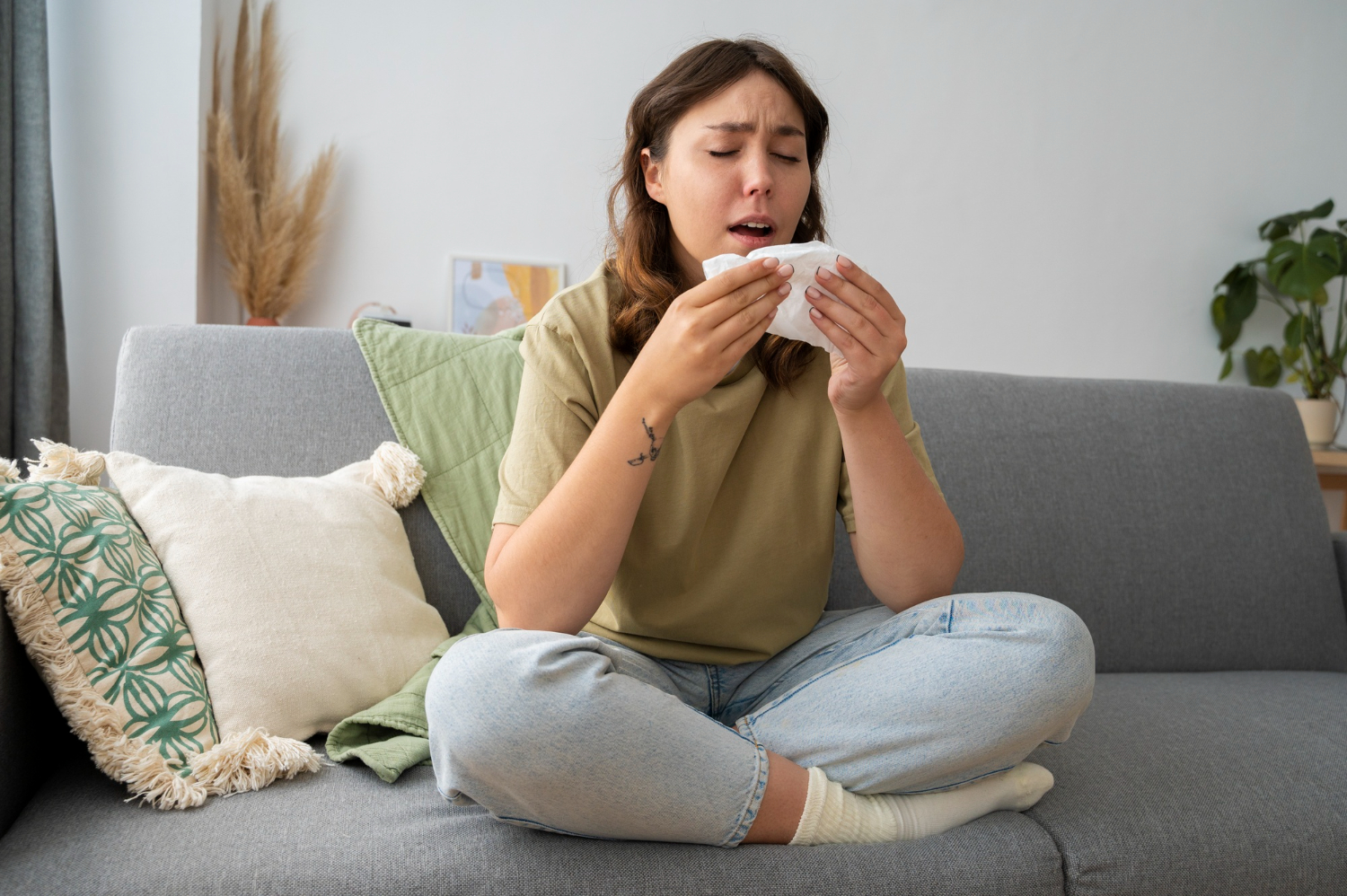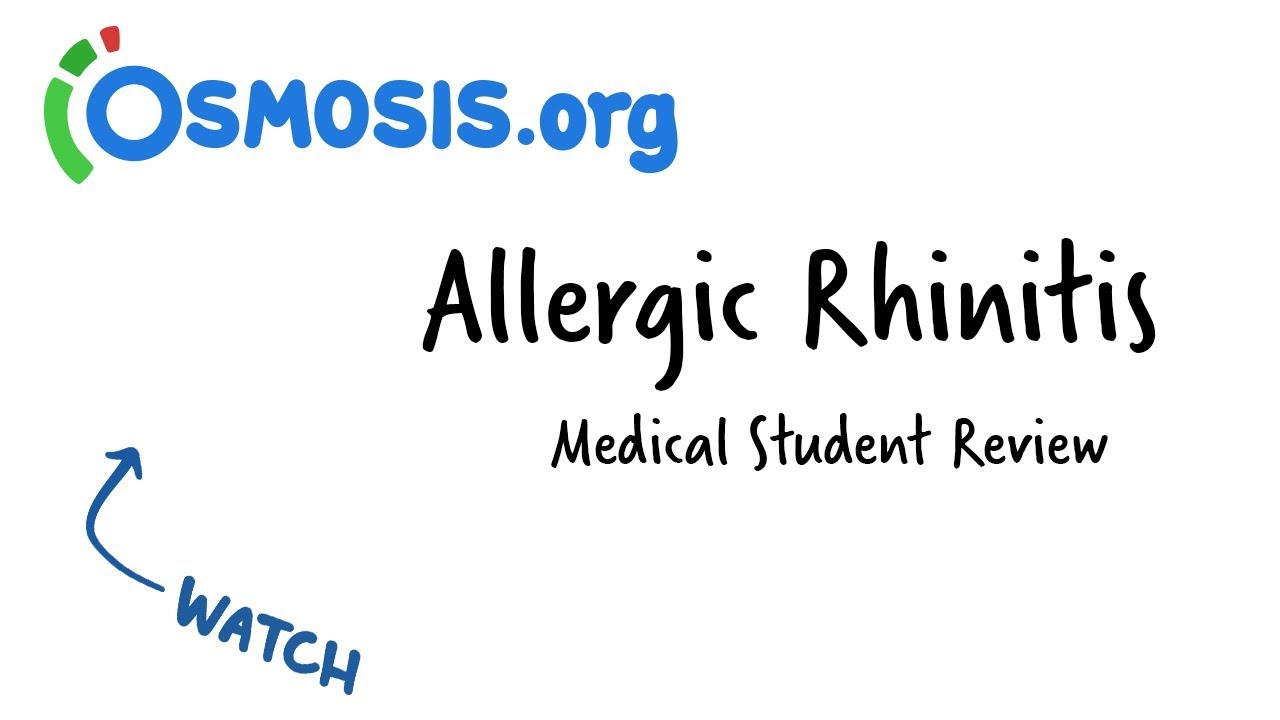Solutions For Allergic Rhinitis Sufferers
Allergic Rhinitis, also known as hay fever, is a common condition that affects millions of people worldwide. It is an allergic reaction to environmental triggers such as pollen, dust mites, pet dander, and mold, among others.
Author:Suleman ShahReviewer:Han JuFeb 07, 202316 Shares962 Views

Allergic Rhinitis, also known as hay fever, is a common condition that affects millions of people worldwide. It is an allergic reaction to environmental triggers such as pollen, dust mites, pet dander, and mold, among others.
When these allergens come into contact with the nose, eyes, or throat, the immune systemreleases histamine and other chemicals, causing symptoms such as sneezing, runny nose, itchy eyes, and nasal congestion.
The symptoms of Allergic Rhinitis can range from mild to severe and can significantly impact a person's quality of life. It is a chronic condition that can last for weeks, months, or even year-round, depending on the severity of the allergy and the frequency of exposure to allergens.
Diagnosis of Allergic Rhinitis is typically based on a person's medical history, physical exam, and allergy tests. Treatment may include medications, allergen immunotherapy, avoidance measures, lifestyle changes, and in severe cases, surgery. Over-the-counter or prescription antihistamines, decongestants, and nasal corticosteroids are common medications used to relieve symptoms.

Allergic Rhinitis | Clinical Presentation
Causes Of Allergic Rhinitis
Allergens are the major cause of allergic rhinitis. When the immune system interprets innocuous substances as a danger, the body creates a defense mechanism to combat the circumstance. Your body begins to produce antibodies to tackle the infection.
If you come into touch with these compounds in any manner, your body responds by generating histamines. Consequently, you begin to combat allergic rhinitis. Potential allergies include the following:
- Dust particles.
- Pollens from plants, including flowers, grass, trees, and weeds.
- Smoke from a cigarette.
- There are insect bites.
- Animal hairs
- Parfums and air contaminants
Even abrupt temperature changes, intense heat and cold, strong winds, and dryness may trigger allergic rhinitis. Again, genetic factors might play an important influence in the development of allergic rhinitis.
If your parents suffered from allergic rhinitis, there is a substantial likelihood that you will have the condition as well. There is a 30 % increased chance of developing allergy rhinitis if any of your parents has the same.
Treatment For Allergic Rhinitis
Avoid Allergens
Avoiding allergens is a key strategy for managing symptoms of allergic rhinitis. This can involve a variety of measures, including:
- Keeping windows closed and using air conditioning during pollen season
- Avoiding outdoor activities during high pollen days
- Cleaning regularly to reduce dust and pet dander in the home
- Wearing a dust mask while gardening or doing other activities that may expose you to allergens
- Avoiding exposure to strong perfumes and other irritants.
By reducing your exposure to allergens, you can reduce the severity of your symptoms and help manage your allergic rhinitis. If you are unsure which allergens are affecting you, consider speaking with an allergist to undergo an allergy test.
Medications
Medications are a common approach for managing the symptoms of allergic rhinitis. The following are some of the most commonly used types of medications:
- Antihistamines: These medications help to block the production of histamine, a substance that triggers allergic reactions. Antihistamines are available over-the-counter or by prescription and can help relieve sneezing, itching, and runny nose.
- Decongestants: These medications help to relieve nasal congestion by narrowing the blood vessels in the nasal passages. Decongestants are available over-the-counter or by prescription and can be taken orally or in nasal spray form.
- Nasal corticosteroids: These medications help to reduce inflammationin the nasal passages and relieve symptoms such as sneezing, itching, and runny nose. They are available by prescription and come in the form of a nasal spray.
- Leukotriene modifiers: These medications help to block the action of leukotrienes, substances that contribute to the symptoms of allergic rhinitis. They are available by prescription and come in the form of tablets or capsules.
It's important to note that while these medications can be effective in managing symptoms, they may also have side effects. Be sure to speak with your doctor before starting any new medication to discuss the risks and benefits and to determine the best treatment plan for you.
Immunotherapy
If you are interested in allergy shots, be sure to discuss the treatment with your doctor. They can help determine if immunotherapy is right for you, and if so, develop a customized treatment plan to meet your specific needs.
Immunotherapy is considered a safe and effective way to manage symptoms of allergic rhinitis and can help reduce the need for other medications. However, it can take several months to see the full benefits, and some people may experience side effects such as redness, swelling, or itching at the injection site.
Allergy shots work by injecting small amounts of the allergen into the body, gradually increasing the dose over time. This helps the body to build up a tolerance to the allergen, reducing symptoms when exposed to it. The treatment is typically administered once a week for several months, followed by a maintenance phase of monthly shots.
Immunotherapy, also known as allergy shots, is a long-term treatment option for people with allergic rhinitis. The goal of immunotherapy is to help the body build up immunity to the allergens that trigger symptoms.
Nasal Irrigation
Nasal irrigation involves using a saline solution to flush out the nasal passages, helping to reduce swelling and remove irritants. It can be done using a neti pot, a special device that pours the saline solution into one nostril and allows it to drain out the other.
Lifestyle Changes
Making simple changes to your lifestyle can also help alleviate symptoms of allergic rhinitis. For example, wearing a dust mask while gardening or avoiding strong perfumes can reduce exposure to allergens.
There are many solutions available to help relieve the symptoms of allergic rhinitis. The most effective approach may be a combination of several of these methods. If your symptoms persist or worsen, be sure to see a doctor for a proper diagnosis and treatment plan.
People Also Ask
How Long Does It Take For Allergic Rhinitis To Go Away?
The duration of Allergic Rhinitis symptoms may vary depending on the severity of the allergy and the frequency of exposure to allergens. In some cases, symptoms can last for weeks, months, or even year-round.
What Are The Natural Remedies For Allergic Rhinitis?
Natural remedies for Allergic Rhinitis may include nasal irrigation, steam therapy, herbal remedies, vitamin C, warm compresses, and others.
Should I See A Doctor For Allergic Rhinitis?
If symptoms persist or become severe, it is important to seek medical advice from a doctor. A doctor can help diagnose Allergic Rhinitis, determine the best course of treatment, and offer advice on managing symptoms.
Final Words
Allergic Rhinitis is a common and manageable condition that can have a significant impact on a person's quality of life. With proper treatment and management, people with Allergic Rhinitis can lead healthy and active lives.
It is important to take steps to manage Allergic Rhinitis and reduce exposure to allergens. This may include using air filters, avoiding outdoor activities during high-pollen times, practicing good hygiene, staying hydrated, and getting enough sleep. If symptoms persist or become severe, it is important to seek medical advice from a doctor.

Suleman Shah
Author
Suleman Shah is a researcher and freelance writer. As a researcher, he has worked with MNS University of Agriculture, Multan (Pakistan) and Texas A & M University (USA). He regularly writes science articles and blogs for science news website immersse.com and open access publishers OA Publishing London and Scientific Times. He loves to keep himself updated on scientific developments and convert these developments into everyday language to update the readers about the developments in the scientific era. His primary research focus is Plant sciences, and he contributed to this field by publishing his research in scientific journals and presenting his work at many Conferences.
Shah graduated from the University of Agriculture Faisalabad (Pakistan) and started his professional carrier with Jaffer Agro Services and later with the Agriculture Department of the Government of Pakistan. His research interest compelled and attracted him to proceed with his carrier in Plant sciences research. So, he started his Ph.D. in Soil Science at MNS University of Agriculture Multan (Pakistan). Later, he started working as a visiting scholar with Texas A&M University (USA).
Shah’s experience with big Open Excess publishers like Springers, Frontiers, MDPI, etc., testified to his belief in Open Access as a barrier-removing mechanism between researchers and the readers of their research. Shah believes that Open Access is revolutionizing the publication process and benefitting research in all fields.

Han Ju
Reviewer
Hello! I'm Han Ju, the heart behind World Wide Journals. My life is a unique tapestry woven from the threads of news, spirituality, and science, enriched by melodies from my guitar. Raised amidst tales of the ancient and the arcane, I developed a keen eye for the stories that truly matter. Through my work, I seek to bridge the seen with the unseen, marrying the rigor of science with the depth of spirituality.
Each article at World Wide Journals is a piece of this ongoing quest, blending analysis with personal reflection. Whether exploring quantum frontiers or strumming chords under the stars, my aim is to inspire and provoke thought, inviting you into a world where every discovery is a note in the grand symphony of existence.
Welcome aboard this journey of insight and exploration, where curiosity leads and music guides.
Latest Articles
Popular Articles